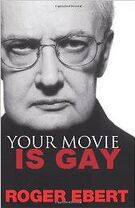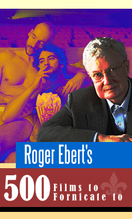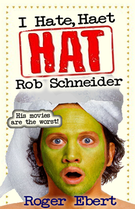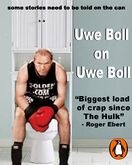Roger Ebert
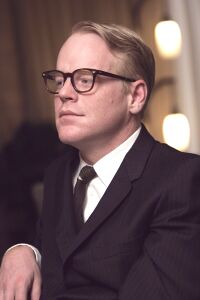
|
cast & credits Roger Ebert Philip Seymour Hoffman |
"One man can not change cinema, but cinema can change a man" read the opening titles of Roger Ebert, the latest biopic from recovering "moneyaholic" Peter Jackson. The quote is all very well and good. The problem is I'm not sure it makes any sense.
This is the story of the greatest film critic who ever lived. Not my words I hope you realise, I read it on the poster on the way into the cinema. Another described me as "larger than life". I was anxious on the short walk to my seat. After all, how does one review the film of one's own life? The film, in fact, tried to answer this question. As the fictional Ebert's father (Robert De Niro) and mentor keeps telling us "whatever you write my son, be it art or criticism, write from the heart." Sorry, what was I supposed to do? "Write from the heart." Wait, which organ was it again? The spleen, right? "No, the heart." Gotcha. Good thing the character kept saying that, otherwise I might not have remembered.
As big Roger battles cancer and the premature death of friend/colleague Gene Siskel (Adrien Brody), we simultaneously see little Roger growing up in Illinois, and spending an inordinate amount of time staring out of windows. This, I presume, is to give us an idea of the vastness of his aspirations.
The performances are better than the characterisation really allows. The older actors - Streep, De Niro - are as solid as ever despite having little more to do than sit in comfy chairs (their motivation for choosing the roles, I fear). The younger performers are acceptable too, even though Rock cusses more in the runtime of this film than Richard Roeper has in all the years I've known him. The supporting cast are just props though, and ultimately this is Hoffman's film.
Hoffman is at his best here, it's only a shame that "best" for him means just above average. Still, it was an interesting choice to have him play me at all stages of my life. The "old-man prosthetics" were actually pretty good. The childhood scenes were a bit strange however, and I actually had to turn away during the breastfeeding scene. Having to watch a 40-year-old man portray the first meal your mother ever gave you is not an experience I would wish upon anybody lightly. Not even Rob Schneider.
As Roger enters the Autumn years of his life, his struggle with thyroid cancer finally costs him his voice, as well as any chance of hosting a TV show again. The film goes far out of its way to tell us that this is a "tender moment". It plays out like a dying season finale: all slow motion and soaring cellos. I almost expected it to turn black and white. Then suddenly it did, much to my dismay.
The dreariness was short-lived however, and quickly replaced by anger and confusion. This is a film that just gets so many things wrong. But it's not the factual inaccuracies that bother me. I've always thought that people who complain when it's "different from the book" should just go and read the book (you'll find that it remains quite faithful to the source material). But no, it's the scientific inaccuracies that tick me off. Regardless of what the producers might think, you can't get thyroid cancer from watching too many movies, no matter how dramatic it makes your plot.
The film follows Ebert through his achievements (winning the Pullitzer), his failures (the years of alcoholism), and his controversies (having to defend the mediocre review of The Godfather Part II everywhere he goes). He devises the "thumbs up, thumbs down" system (something the film treats as a revelation of Biblical proportions), we all know how it goes. Or so it seems. Frankly the decision to have him die at the end was surprising. No one saw that coming, least of all me. Even in the theatre people kept turning around to check if I was alright. Some people will complain, but in my opinion it was a good move. Too often biopics are fact-based and predictable, but here Jackson has taken the Inglourious Basterds route, and the film is better for it.
However, I couldn't shake the feeling that Jackson was wishing me dead. Few men have such opportunities to create fantasy worlds, and he used that opportunity to create one in which I died. Perhaps I was a little hasty when I said his remake of King Kong was the only movie I'd seen that didn't improve on showing a blank screen for the same amount of time...
Answer Man
Q. You've been pretty curt when it comes to separating the fact from the fiction with this film, so I wanted to ask: Did Gene Siskel really leave you his thumbs when he died?
Jonathon Z. Johnson, Phoenix, AZ
A. That was one of the few scenes that was based on fact. I still have the thumbs, and use them very rarely for giving truly awful films "three thumbs down". Sigh, that's what Gene would have wanted.
Q. That scene where you banged Anne Hathaway was awesome, it looked totally real! Man, I'd love to hit that shit. Do you still have her number?
Hogan Jefferson, Manchester, UK
A. First of all, it was Philip Seymour Hoffman who "banged" Miss Hathaway, not me. This is a movie, not some kind of "docu-porn" as you seem to think it is. And second, even if I did have her number I wouldn't give it out to mentally deficient internet users.
Q. The guy who played Ebert's college friend was really familiar. What else has he been in?
Michelle Ephraim, Queensland, AUS
A. Ah yes, that was the renowned performer and ex-racer Swift Bobby. He is best known for playing Gandalf's trusty steed Shadowfax in The Lord of the Rings Trilogy.
Q. Do you have Debbie Does Dallas? Can I borrow it?
Richard Roeper, Chicago, IL
A. What, again?
Q. How can "Say Hello, Wave Goodbye" be the first dance at Ebert's wedding when the song came out in 1982 but they supposedly got married in 1969?
Jenny French, Munich, DE
A. You're trying to apply real world logic to a film where doctors don't wear masks while operating, and in emergencies are allowed to use ordinary kitchen utensils as surgical tools. My advice would be to not let it keep you up at night.
Latest Reviews
- The Godfather Part II - and why it's still mediocre
- 2001: A Space Odyssey
- Takeshi's Castle
- The Wizard of Aus
- IMDb the Movie
- Star Wars (2010)
| Featured version: 26 July 2010 | |
| This article has been featured on the main page. — You can vote for or nominate your favourite articles at Uncyclopedia:VFH. | |
| Film world: | Academy Awards ♦ AFI (American Film Institute) ♦ Bollywood ♦ Film colorization ♦ Golden Raspberry Awards ♦ Hays Code ♦ Horny Awards ♦ Internet Movie Database ♦ Lens flare ♦ Roger Ebert ♦ Screenwriting ♦ Gene Shalit ♦ UnReviews |
| Studios: | 20th Century Fox ♦ Disney ♦ DreamWorks ♦ MGM ♦ Paramount ♦ Pixar ♦ Sony Pictures ♦ United Artists |
| Narrators: | David Attenborough ♦ Morgan Freeman ♦ Movie Trailer Announcer Guy |
| Types: | Albanian interpretationalist cinema ♦ B-movie ♦ Cult film ♦ Film noir ♦ Independent film ♦ Parody film ♦ Sequel ♦ Snuff film ♦ Western |
